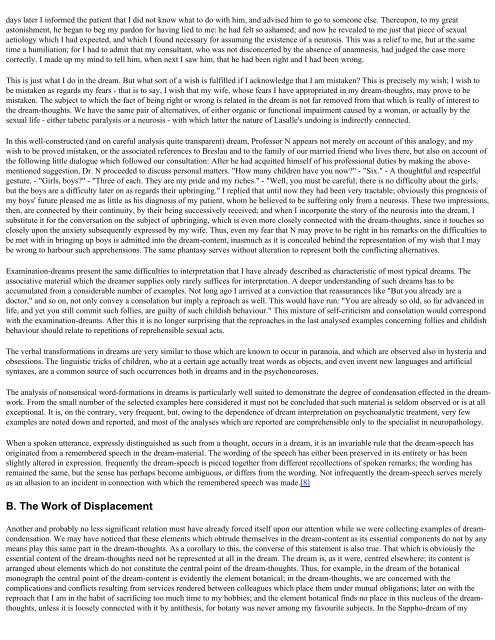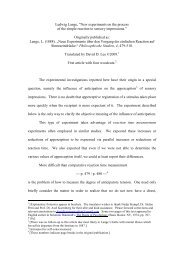The Interpretation Of Dreams Sigmund Freud (1900) PREFACE
The Interpretation Of Dreams Sigmund Freud (1900) PREFACE
The Interpretation Of Dreams Sigmund Freud (1900) PREFACE
You also want an ePaper? Increase the reach of your titles
YUMPU automatically turns print PDFs into web optimized ePapers that Google loves.
days later I informed the patient that I did not know what to do with him, and advised him to go to someone else. <strong>The</strong>reupon, to my great<br />
astonishment, he began to beg my pardon for having lied to me: he had felt so ashamed; and now he revealed to me just that piece of sexual<br />
aetiology which I had expected, and which I found necessary for assuming the existence of a neurosis. This was a relief to me, but at the same<br />
time a humiliation; for I had to admit that my consultant, who was not disconcerted by the absence of anamnesis, had judged the case more<br />
correctly. I made up my mind to tell him, when next I saw him, that he had been right and I had been wrong.<br />
This is just what I do in the dream. But what sort of a wish is fulfilled if I acknowledge that I am mistaken? This is precisely my wish; I wish to<br />
be mistaken as regards my fears - that is to say, I wish that my wife, whose fears I have appropriated in my dream-thoughts, may prove to be<br />
mistaken. <strong>The</strong> subject to which the fact of being right or wrong is related in the dream is not far removed from that which is really of interest to<br />
the dream-thoughts. We have the same pair of alternatives, of either organic or functional impairment caused by a woman, or actually by the<br />
sexual life - either tabetic paralysis or a neurosis - with which latter the nature of Lasalle's undoing is indirectly connected.<br />
In this well-constructed (and on careful analysis quite transparent) dream, Professor N appears not merely on account of this analogy, and my<br />
wish to be proved mistaken, or the associated references to Breslau and to the family of our married friend who lives there, but also on account of<br />
the following little dialogue which followed our consultation: After he had acquitted himself of his professional duties by making the abovementioned<br />
suggestion, Dr. N proceeded to discuss personal matters. "How many children have you now?" - "Six." - A thoughtful and respectful<br />
gesture. - "Girls, boys?" - "Three of each. <strong>The</strong>y are my pride and my riches." - "Well, you must be careful; there is no difficulty about the girls,<br />
but the boys are a difficulty later on as regards their upbringing." I replied that until now they had been very tractable; obviously this prognosis of<br />
my boys' future pleased me as little as his diagnosis of my patient, whom he believed to be suffering only from a neurosis. <strong>The</strong>se two impressions,<br />
then, are connected by their continuity, by their being successively received; and when I incorporate the story of the neurosis into the dream, I<br />
substitute it for the conversation on the subject of upbringing, which is even more closely connected with the dream-thoughts, since it touches so<br />
closely upon the anxiety subsequently expressed by my wife. Thus, even my fear that N may prove to be right in his remarks on the difficulties to<br />
be met with in bringing up boys is admitted into the dream-content, inasmuch as it is concealed behind the representation of my wish that I may<br />
be wrong to harbour such apprehensions. <strong>The</strong> same phantasy serves without alteration to represent both the conflicting alternatives.<br />
Examination-dreams present the same difficulties to interpretation that I have already described as characteristic of most typical dreams. <strong>The</strong><br />
associative material which the dreamer supplies only rarely suffices for interpretation. A deeper understanding of such dreams has to be<br />
accumulated from a considerable number of examples. Not long ago I arrived at a conviction that reassurances like "But you already are a<br />
doctor," and so on, not only convey a consolation but imply a reproach as well. This would have run: "You are already so old, so far advanced in<br />
life, and yet you still commit such follies, are guilty of such childish behaviour." This mixture of self-criticism and consolation would correspond<br />
with the examination-dreams. After this it is no longer surprising that the reproaches in the last analysed examples concerning follies and childish<br />
behaviour should relate to repetitions of reprehensible sexual acts.<br />
<strong>The</strong> verbal transformations in dreams are very similar to those which are known to occur in paranoia, and which are observed also in hysteria and<br />
obsessions. <strong>The</strong> linguistic tricks of children, who at a certain age actually treat words as objects, and even invent new languages and artificial<br />
syntaxes, are a common source of such occurrences both in dreams and in the psychoneuroses.<br />
<strong>The</strong> analysis of nonsensical word-formations in dreams is particularly well suited to demonstrate the degree of condensation effected in the dreamwork.<br />
From the small number of the selected examples here considered it must not be concluded that such material is seldom observed or is at all<br />
exceptional. It is, on the contrary, very frequent, but, owing to the dependence of dream interpretation on psychoanalytic treatment, very few<br />
examples are noted down and reported, and most of the analyses which are reported are comprehensible only to the specialist in neuropathology.<br />
When a spoken utterance, expressly distinguished as such from a thought, occurs in a dream, it is an invariable rule that the dream-speech has<br />
originated from a remembered speech in the dream-material. <strong>The</strong> wording of the speech has either been preserved in its entirety or has been<br />
slightly altered in expression. frequently the dream-speech is pieced together from different recollections of spoken remarks; the wording has<br />
remained the same, but the sense has perhaps become ambiguous, or differs from the wording. Not infrequently the dream-speech serves merely<br />
as an allusion to an incident in connection with which the remembered speech was made.[8]<br />
B. <strong>The</strong> Work of Displacement<br />
Another and probably no less significant relation must have already forced itself upon our attention while we were collecting examples of dreamcondensation.<br />
We may have noticed that these elements which obtrude themselves in the dream-content as its essential components do not by any<br />
means play this same part in the dream-thoughts. As a corollary to this, the converse of this statement is also true. That which is obviously the<br />
essential content of the dream-thoughts need not be represented at all in the dream. <strong>The</strong> dream is, as it were, centred elsewhere; its content is<br />
arranged about elements which do not constitute the central point of the dream-thoughts. Thus, for example, in the dream of the botanical<br />
monograph the central point of the dream-content is evidently the element botanical; in the dream-thoughts, we are concerned with the<br />
complications and conflicts resulting from services rendered between colleagues which place them under mutual obligations; later on with the<br />
reproach that I am in the habit of sacrificing too much time to my hobbies; and the element botanical finds no place in this nucleus of the dreamthoughts,<br />
unless it is loosely connected with it by antithesis, for botany was never among my favourite subjects. In the Sappho-dream of my



